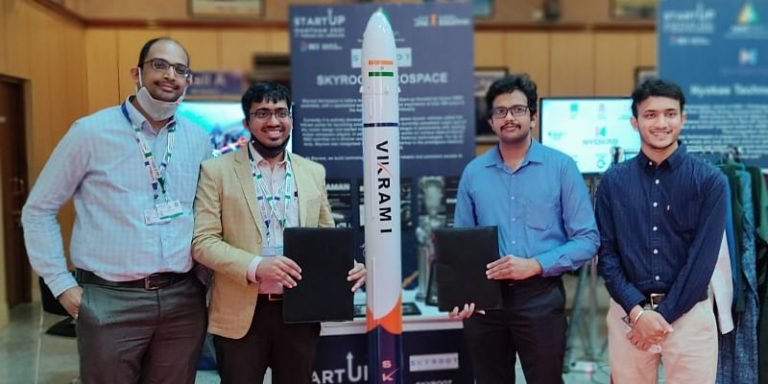Skyroot Aerospace, a Hyderabad-based startup, has recently made headlines with the successful test-firing of its upper-stage rocket engine. This achievement marks a significant milestone for the company, underscoring its advancements in space technology and its potential impact on the aerospace industry.
Skyroot Aerospace: Hyderabad Startup Achieves Milestone with Successful Upper-Stage Rocket Engine Test
With the Indian government’s increased support for private space ventures and the recent space technology reforms by ISRO, the space-tech sector is experiencing unprecedented growth. Leveraging this momentum, Hyderabad-based Skyroot Aerospace has successfully test-fired an upper-stage rocket engine and showcased India’s first fully 3D-printed bipropellant liquid rocket engine injector, named Kalam-5. This injector is part of the Kalam series, which is designed to cut the overall mass of space vehicles by 50% compared to traditional manufacturing methods.
Founded in 2018 by former ISRO scientists Pawan Kumar Chandana and Naga Bharath Daka, Skyroot Aerospace specializes in small satellite launch vehicles (SSLVs). The company has become the first Indian firm to successfully test an indigenous rocket engine. Skyroot’s launch vehicles provide affordable orbital launch services where customers are charged based on their satellite’s mass.
On December 22, Skyroot tested the Kalam solid propulsion engine at Solar Industries’ facility in Nagpur. Solar Industries, a major ammunition manufacturer and defense contractor, is a key partner and investor in Skyroot, alongside Curefit co-founders Mukesh Bansal and Ankit Nagori, and other angel investors.
Chandana, Skyroot’s CEO, highlighted that the Kalam-5 engine employs 15 advanced materials and nine manufacturing processes, with zero moving parts. Its carbon composite structure, created through an automated process, is five times lighter than steel. “The test results were very close to our predictions, boosting our confidence in the Vikram-I vehicle development,” said Chandana.
An advanced version of the Kalam engine will be tested at ISRO facilities before being used in the Vikram rocket by December 2021. “This subscale version of our KALAM 100 motor demonstrates our solid propulsion technology, which will be used in the three solid stages of the Vikram 1 launch vehicle,” noted Daka, the company’s COO.
Skyroot has also unveiled the first of its five Kalam series solid rocket motors, with thrust ranging from 5 kN to 1000 kN (~100 tons). The remaining four motors are in various stages of production and will be tested throughout 2021. The Kalam-5, a demonstrator stage, matches the propellant, materials, and interfaces of the Vikram-1’s solid propulsion stages. It delivers a peak sea-level thrust of 5.3 kN and can withstand 66 atmospheres of pressure and temperatures of 30,000°C.
In a strategic move, Skyroot Aerospace has partnered with Bangalore-based Bellatrix Aerospace through a Memorandum of Understanding (MoU). The partnership aims to incorporate Bellatrix’s Orbital Transfer Vehicle (OTV) into the upper stage of Skyroot’s Vikram series launch vehicles. The OTV will function as a “taxi in space,” transporting satellites to their designated orbits.
Bellatrix Aerospace CEO Rohan Muralidhar commented, “This partnership will enable us to meet complex mission requirements and reduce the cost of space access. With the growing need for timely satellite deployments and rideshare missions, OTVs are becoming essential. We are excited to develop efficient and cost-effective OTVs for this purpose.”

